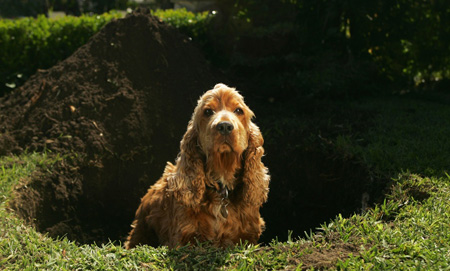Why Do Dogs Dig

Why do dogs dig? Digging is a primal behavior for dogs and the amount of digging they do can be influenced by underlying reasons.
Dogs are genetically predisposed to dig; it’s a normal behavior for dogs. It’s fun, and nothing feels better on a hot day than laying in cool, freshly unearthed soil. While digging is a natural act for them, it’s usually objectionable to the dog’s owner who may prefer to keep their landscaping design intact.
Dogs also dig out of boredom
Digging is a stress reliever and it gives the pet something to do. If your dog is out in the yard all day, your property may soon resemble a slice of swiss cheese. When the dog’s boredom or anxiety is relieved from the act of digging, it becomes self-reinforcing and digging will soon become a learned, stress-relieving behavior. It is harder for a dog to unlearn a behavior than to learn a new behavior, so it’s best not to put him in a position where he feels he must dig to relieve anxiety.
In cases such as this, spending more time with the pet, providing stimulating things for him to do while in the yard and increasing his exercise usually resolves excessive digging. For great ideas on providing stimulation for your dog indoors and out, purchase a copy of the book, Woof it Up! A Guide to Happy Dogs and Happy Owners.
Many pet owners try fencing off areas that are attractive to a digging pet, scolding the pet, using scent deterrents or keeping the pet out of the yard. While all of these actions may prevent digging, they don’t deal with the root problem of why the dog is digging in the first place. If the underlying problem is not addressed, and digging is no longer an option, the dog may adapt a new unwanted behavior to relieve his anxiety, such as excessive barking.
The Sandbox Solution
Our dog trainers recommend sand boxes for dogs that dig. A small covered sandbox can be purchased at toy stores and at most home improvement stores. The advantage of a sandbox is that it allows the dog to fulfill a primal need in a safe area that you control. If the dog can dig in the sandbox, there’s no need for him to destroy your flower garden.
For success, dogs need to be introduced to a sandbox. Most dogs, even the most advanced diggers, will not dig in front of you, so you must teach them that digging in this place is exactly what you want him to do. We recommend that you hide several new toys in the sand and help your dog find them to acclimate him to his new digging spot.
Sit with him for five or ten minutes so that he understands that this is his play area and digging here is supported by you. Change the dog toys weekly to keep them stimulating for your pet.
Roots and underground insects/vermin
Some shrub varieties are irresistible to dogs and they will stop at nothing to get to the plant’s roots. Gardenia shrubs are especially susceptible. It is unknown if it’s the roots of this plant that are attracting the dog or the host of insects and bacterium which typically plague this species. You are likely in a losing battle if your dog has access to Gardenia shrubs and the simplest solution may be to remove them from the yard.
Dogs will also track and dig for vermin in the yard. Mole season is especially challenging for dog owners. As the vermin runs underground, the dogs dig in pursuit leaving elongated trench-like appearing holes in their wake. While most dogs find this pursuit activity desirable, terriers and other breeds which have been bred to hunt vermin have to do it- it’s hard wired in their genes.
The State of North Carolina considers moles a protected species so eliminating the moles (the root cause in this case) is not an option.
Managing the environment may be your best solution here. Limit your pet’s access to the yard and supervise him while he’s in the yard. Thankfully, moles are seasonal and this too shall pass.
The goal of all dog training is to provide peaceable solutions to everyday problems so that pets and their owners live harmoniously. Paws in Training provides dog and cat training services in Raleigh, Apex, Holly Springs, Cary, Fuquay Varina and Garner, N.C.

